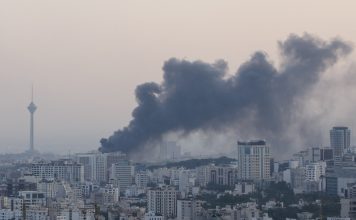By Ahmad Rafat
The recent knife attack on the acclaimed author Salman Rushdie is a shock episode that has shaken the international community. The assailant allegedly tried to carry out a death sentence issued by the late Ayatollah Ruhollah Khomeini, the founder of the Islamic Republic, three decades ago.
Mr. Rushdie, an Indian-born British-American author, was attacked on Aug. 12 in Chautauqua County, New York, at an event where he was scheduled to discuss the U.S. “as an asylum for writers and other artists in exile and as a home for freedom of creative expression.”
[aesop_image img=”https://kayhanlife.com/wp-content/uploads/2022/08/salma-rushdie-kayhanlondon.jpg” panorama=”off” credit=”KL./” align=”center” lightbox=”on” captionsrc=”custom” captionposition=”left” revealfx=”off” overlay_revealfx=”off”]
Rushdie survived the attack but suffered life-changing injuries. Hadi Matar, a 24-year-old man from Fairview, New Jersey, was charged with attempted murder and assault, and he was held without bond.
The episode is an illustration among many of the attacks on freedom of speech and expression in Iran.
In the last 30 years, several writers have been killed in the Islamic Republic for the same reasons, including Ali Akbar Saeedi-Sirjani (1931-1994), Ahmad Mir-Alaei (1942-1995), Majid Sharif (1951-1998), Mohammad Mokhtari (1942-1998), Mohammad Jaffar Pouyandeh (1998) and many others.
There were still others killed decades before, including Ahmad Kasravi (1890-1946), a critic of religions, particularly Shia Islam, stabbed inside the Tehran Courthouse (Palace of Justice) by Fadaiyan-e Eslam.
Fadaiyan-e Eslam (Devotees of Islam) was a Shia fundamentalist group founded in 1946 in Iran and later registered as a political party in 1989.
Ali Dashti (1897-1982) was a journalist and author whose criticism of Islam and famous book “Twenty-Three Years: A Study of the Prophetic Career of Mohammad” angered the Islamic Republic. He was arrested and sentenced to death after the 1979 Revolution and died two years later in a hospital. He was 84 years old at the time of his death.
Rushdie’s book “The Satanic Verses,” first published in 1988, sparked controversy over its depiction of the Prophet Mohammad.
Ayatollah Khomeini, the founder of the Islamic Republic, issued a fatwa (religious edict) on Feb. 14, 1989 (33 years ago), ordering Muslims to kill Rushdie. Rushdie went into hiding for years following the death threat.
Some translators and publishers involved in publishing “The Satanic Verses” have been the victims of attacks, some of them fatal.
Hitoshi Igarashi, who translated “The Satanic Verses” into Japanese, was stabbed to death at his house in a Tokyo suburb in July 1991.
Ten days earlier, Ettore Capriolo, who translated the novel into Italian, was attacked and seriously injured near his house in a Milan suburb.
The Norwegian publisher of the novel, William Nygaard, was a victim of a knife attack on Oct. 11, 1993, and was hospitalized for a few months.
Aziz Nesin (1915-1995), a prominent Turkish writer, humorist, and author, who translated “The Satanic Verses” into Turkish, survived a fire aimed at killing him in which 37 others lost their lives.
Even before Khomeini’s fatwa, several people died in clashes between police and Muslim extremists protesting against “The Satanic Verses” in India and Pakistan.
Nima Publishing’s offices, which published the Farsi translation of the book, were set on fire.
The managing editor of the Sulaymaniyah-based Khalgh magazine, which published excerpts of the book in 2010, survived an armed attack, but the translator has lived in hiding since then.
The British government provided round-the-clock security for Rushdie during the decade he lived in hiding.
In February 1997, Ayatollah Hassan Sanaei, head of the Fifteenth of Khordad Foundation, said the foundation would increase the blood money offered to kill Rushdie from $2 million to $2.5 million.
A semi-official religious foundation increased the reward it had offered to kill Rushdie from $2.8 million to $3.3 million.
Rushdie’s assailant, Hadi Matar — whose parents had emigrated from Lebanon to the U.S. — will not receive the award, given that he failed to carry out the fatwa. However, there could be others who may try to collect the reward.
Although former Iranian President Mohammad Khatami (in office from 1997 to 2005) declared the fatwa “finished,” Iran’s Supreme Leader Ayatollah Ali Khamenei reiterated the fatwa in 2004, stressing that it was “irreversible.”
Several hardline newspapers in Iran, including the Tehran-based Kayhan, have praised Rushdie’s assailant.
Kayhan’s front-page headline on Aug. 14 said: “God Has Exacted Revenge on Salman Rushdie. Trump and Pompeo are next.”
“A thousand bravos to the brave and dutiful person who attacked the apostate and evil Salman Rushdie in New York,” the paper added. “The hand of the man who tore the neck of God’s enemy must be kissed.”
Jame Jam newspaper, owned by the Islamic Republic of Iran Broadcasting (IRIB), placed a picture of Rushdie with devil horns on its front page, saying: “Devil’s eye was blinded,” referring to news that Rushdie could lose an eye because of the attack.
“The attempt on Rushdie’s life, even after 33 years, clearly shows that the power to exact revenge by those who are right on those who are wrong transcends time and place,” the paper added.
The Iranian people know all about official and unofficial fatwas. Many are ostensibly issued in the name of Islam to protect its values but serve as a tool to justify the state’s failures or are used to silence the opponents of the Islamic Republic or suppress scholarly works that provide a judicious view of Islam, which does not differ from thousands of critical writings on other religions.
Ayatollah Khomeini did not issue the fatwa against Rushdie immediately after “The Satanic Verses” publication in 1988. The decree came months later when Muslim mobs — most of whom had not even read the book — poured into the streets in India and Pakistan, protesting the publication of “The Satanic Verses,” and after the United Nations Security Council Resolution 598 (signed in July 1987), which called for an immediate ceasefire between Iran and Iraq, went into effect in August 1988.
In the past 43 years, the Islamic Republic has diverted the public’s attention away from domestic problems by creating a crisis abroad. Iranian people expected the Islamic Republic to rebuild the country and invest in its people after the eight-year war with Iraq in 1988.
However, by issuing a fatwa against Salman Rushdie on the 10th anniversary of the Islamic Revolution, the state once more diverted attention from the nation’s domestic problems by sparking an international incident.
Salman Rushdie has repeatedly said that “The Satanic Verses” is not a book against Islam. Rushdie expresses his fear of absolutism in the book and highlights to his readers the need for dialogue, freedom, critical judgement, mutual understanding, tolerance, and the right to question.
Rushdie even apologized to Muslims whose feelings were hurt by the book.
However, the issue was not people’s feelings being hurt, but urging devout Muslims to use their critical judgment and not succumb to politicized Islam and those who wish to rule in the name of Islam and do not tolerate any opposition.
People can agree or disagree or like or dislike any book’s narrative, writing style, or content, including “The Satanic Verses.” Some literary critics argued that “The Satanic Verses” was not as strong as one of Rushdie’s previous novels, “Midnight’s Children,” which won the prestigious Booker Prize in 1981.
The issue is not the literary merits of “The Satanic Verses.” We can criticize the novel and even regard it as an insult to Islam. However, none of these issues justify infringing on a writer’s freedom of speech and expression and calling for their death.
The knife attack on Rushdie is an assault on freedom of speech and expression. In recent years, dozens of artists and writers whose thoughts are not aligned with the ruling system in their respective countries have been imprisoned or killed.
Safety Concerns Loom as Writers Show Public Support for Rushdie
Extremist clerics in India and Bangladesh have issued several fatwas, calling for the death of Taslima Nasrin, a Bangladesh-Swedish writer, physician, feminist, secular humanist, and activist, after she expressed her support for Rushdie.
Although Rushdie’s attacker, Matar, had posted comments supporting the Islamic Republic on social media, authorities have yet to establish a direct link between him and the Islamic Revolutionary Guards Corps (IRGC), the Iranian security agencies, and Lebanese Hezbollah.
In a video interview with the New York Post on Aug. 17, Mr. Matar praised Ayatollah Khomeini.
“I respect the ayatollah. I think he’s a great person. That’s as far as I will say about that,” Matta told the paper.
Matar denied having any connection to the IRGC in the same interview. However, Ayatollah Khomeini’s fatwa against Rushdie states that “proud Muslims worldwide” do not need to be from a specific country or belong to an organization or institution. They or one of their associates can carry the decree wherever they are.
Attacker ‘Carried Out Rushdie’s Apostasy Sentence,’ Iranian MP Says





